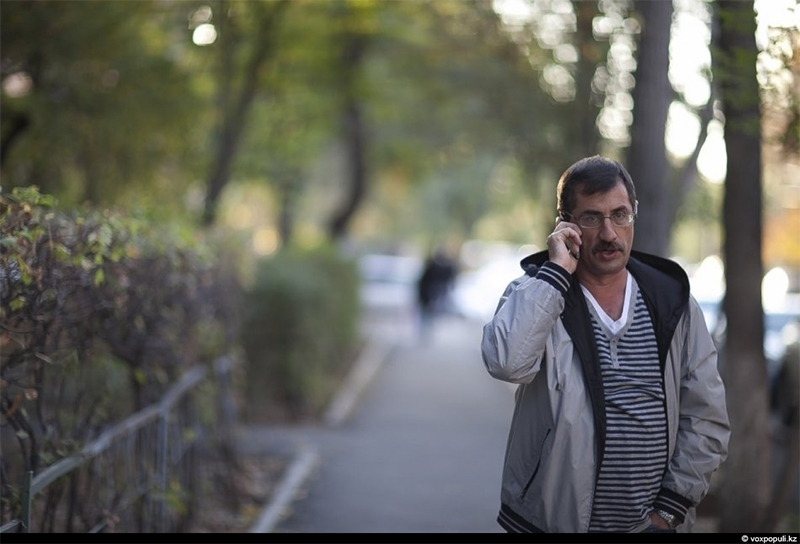Yevgeny Zhovtis: They built me a personal prison
- 23.06.2014, 11:06
- 4,999
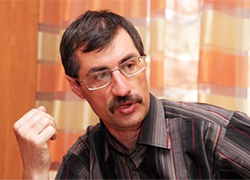
The Eurasian Economic Union unites dictators who get together to discuss repressions.
In an interview to editor-in-chief of charter97.org Natallia Radzina, well-known Kazakh human rights defender Yevgeny Zhovtis told about his time in prison, the situation in Kazakhstan and other countries of Middle Asia, and about why Putin is creating the Eurasian Union.
- Yevgeny, our meeting is taking place after the creation of the so-called Eurasian Economic Union. Taking into consideration the Russian-Ukrainian war, there is a popular opinion that the USSR with its aggressive foreign politics is being restored. You are a Kazakh citizen, I am Belarusian. Are we back to the USSR, 23 years later?
- The entire post-soviet space including the Caucasus, Transcaucasia and Central Asia but excluding the Baltic States, Moldova and Georgia, has remained more or less authoritarian. The only difference is in the degree of violence of their authoritarian regimes.
Since the mid-90s, post-soviet states have been drifting towards an authoritarian model of governance, partially due to a number of objective reasons such as privatization realized to meet the demands of the ruling communist or post-communist elite. Therefore, the main task of the nomenclature was to build political structures that would protect their interests and control the people.
This movement towards authoritarianism has always existed, and the way the official representatives of these countries behaved in the OSCE shows that this gang has always acted in close cooperation and shared common interests. One could describe their approach with only a few words.
First of all, it is the anti-West ideas and the thesis ”don’t interfere with our home affairs, human rights are an internal issue despite all OSCE documents”. Secondly, another thesis: “we don’t care about your free elections, human rights and so forth, all that matters to us is a total control that leads to stability and longevity of our rule.”
The Ukrainian conflict has revealed this entire revanchism and neocolonialism. Putin’s economic initiatives inevitably get a political tone, because in an integration process the interests of the strongest economy always prevail.
Whenever we deal with authoritarian states, the outcome is rather predictable. They always have the same behavioral pattern: “referendum” about prolongation of the power; constitutional alterations; exchange of technologies; and gradual demolition of the opposition, media, human rights institutions and public organizations.
I am convinced that the main purpose of the Eurasian Union is to preserve these authoritarian regimes, unify their approaches and create routines for regular exchange of information and repression practice.
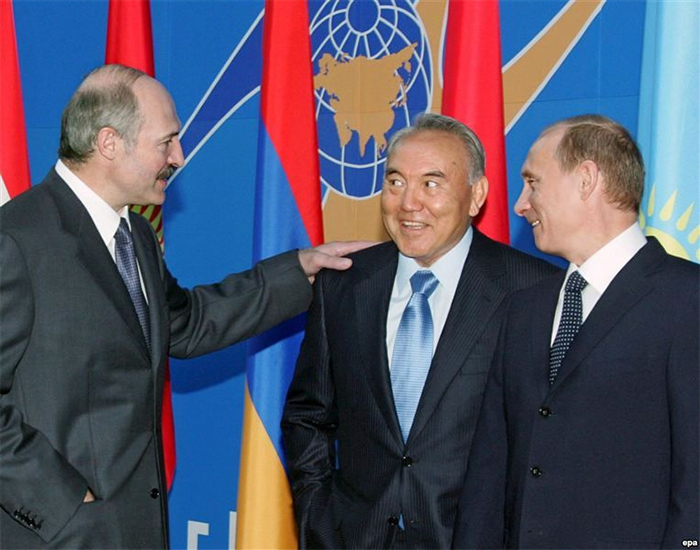
- In other words, back to USSR.
- Let me put it this way: the USSR is alive in several forms. It is alive as a system of relations between the state and the people, where the latter is subordinate. It is alive in the minds occupied by the idiotic idea of conspiracy carefully sustained by the powers. It is alive in the principles of formation of the ruling elites – loyalty and commitment.
Finally, and most importantly, it is alive and flourishing in these countries because there are so few citizens – there is only a subordinated population. This is a crucial moment. For example, in Kazakhstan, there operate small groups that emerged in the early 90s from different oppositional parties, as well as surviving or new NGOs, but they are so insignificant and feeble that they remind more of an institutionalized neo-dissident movement.
- Today, Russia is supporting post-soviet dictator regimes just the way the USSR tried to control marionette regimes of the world.
- Putin is not the only one to support dictatorships. Our friends from democratic countries do it, too. Economic and security interests prevail, which is typical for realpolitik.
However, there is more than just pragmatism behind Putin’s support of these regimes. The main reason is the common resistance to the western world. Old soviet technologies are in use.
Ironically, the USSR spent most of the 20th century trying to support revolutionists all over the world. Today, descendants of the communist party believe that revolutions cause most damage, although for almost 100 years their leaders claimed revolutions to be the best way for the working
- You mentioned realpolitik practiced by the West. It is not new; oil, gas and uranium made the West ignore crimes of Nazarbayev’s regime, former British PM Tony Blaire even became his councilor – for a corresponding salary. Nor did they react to the situation in Belarus. Today, they focus only on Ukraine and miss the broad picture. Don’t they realize that the “stable” dictatorships make the situation in the post-soviet space utterly unstable?
- This is a difficult question. In my view, as for the issue of a common ground, we shouldn’t overrate the West. We do have people who lead the entire western civilization and stand for the principles and values that gained their final form after the WWII and are documented in a number of international treaties, such as the UN Charter and the Universal Human Rights Declaration.
On the other hand, obviously, even if historic processes become faster, the 50 or 70 years that passed since the WWII is a very little time historically. It is wrong to expect tectonic changes in this short period.
Personally, I am very impatient. We want to see fast changes in a short time; we think that if the West becomes more persistent everything will be different. What has happened now? Why is the way the Russian powers act so shocking for the West? This problem doesn’t concern only Putin who has benefited from Kyiv’s weakness, annexed Crimea and now is trying to seize the east of the country.
Have you noticed how quickly the people of Russia relapsed into the USSR, how quickly they united to agree and support everything the powers do? The attacks on Andrei Makarevich, Boris Grebenschekov… Thank God, they have not been shot by a firing squad, like “mad dogs” in the 30s. It seems like the entire country failed to learn anything from the tragic history of the mid-20th century.
Stalinism and communism still exist, lustration has never been accomplished, and we have never followed the example of Eastern Europe. We haven’t had the mental changes that the Germans had. They have paid their dues for fascism while we haven’t paid ours for communism.
- Are you trying to justify the passiveness of the West?
- No, I am not. The West is trying to act from some specific historic perspectives. For example, in Central Asia they want to avoid destabilizing what they find relatively stable. They hope that the tiny seeds of market economy and institutions can help change something.
In my view, these calculations are very naïve, because nobody is working with any of their suggestions. The current construction processes are not for development, but for support of the structure completely rotten inside. It leads nowhere.
As I once said in the European Commission in Brussels, today Europe is painting seats and training the machinist in a wagon rolling from a mountain. The wagon is going down, not up, and it won’t change direction even if the machinist runs it perfectly. You need to build a new structure instead of letting the wagon roll down, if you truly want to help.
I would not say that the politics that the West has today is completely shortsighted. Unfortunately, it is not leading anywhere, which the Russian situation shows. For a long time, there was an opinion that a generation shift is necessary for changes, but we missed many opportunities of the 90s, and today we are facing the consequences. Moreover, I have a feeling that the West will soon have to deal with worse problems, and Russia is only the beginning.
The last thing. We have to realize that the West and its forefront – the EU, U.S., Canada and Australia – cannot push too hard when they fail to see any potential in the societies of our countries. For example, in Kazakhstan, everything is very sad, and any change is possible only inside an elite process.
- Nazarbayev has done it all: shooting in Zhanaozen, murders and arrests of opposition leaders…
- Naturally. He has been defending his power. He was a lawnmower, as I call it, cutting down everything that grew, making an even lawn, unsuitable even for sheep. Therefore, the society lacks an internal drive to protect its dignity, rights and values of freedom itself.
Very often in my lectures, I speak about the prison system and attitude to it in the country. People do not understand that imprisonment is a terrific punishment. They see no value in their freedom, they do not fear to lose it. It speaks volumes. Most of our people will say that there is nothing terrible with a prison sentence. For me, however, it was the worst tragedy because I could not do what I chose or wanted to do…
- They say that they built you your own prison in Kazakhstan.
- Funny story. My so-called crime was a type of crime committed out of carelessness. In Kazakhstan, there was one settlement for those who committed this type of crimes. It was located in the city borders of Astana. Obviously, they could not take me to the capital with its diplomatic presence and media. It would lead to pilgrimage. Moreover, such a settlement-prison allows limitless visits.
So, they decided to open another settlement in Ust-Kamenogorsk, in the premises of a former medical labor rehabilitation center. As you understand, since I could not be its only prisoner, they relocated 150 other prisoners from the settlement in Astana. These people were put on trains and taken to the east, far from their families.
The settlement treated me in a ”special” way, of course. The first thing I heard when I stepped out of the prison vehicle was “Who is Zhovtis?” They wanted to see the guy that caused a 1100-kilometer relocation of prisoners.
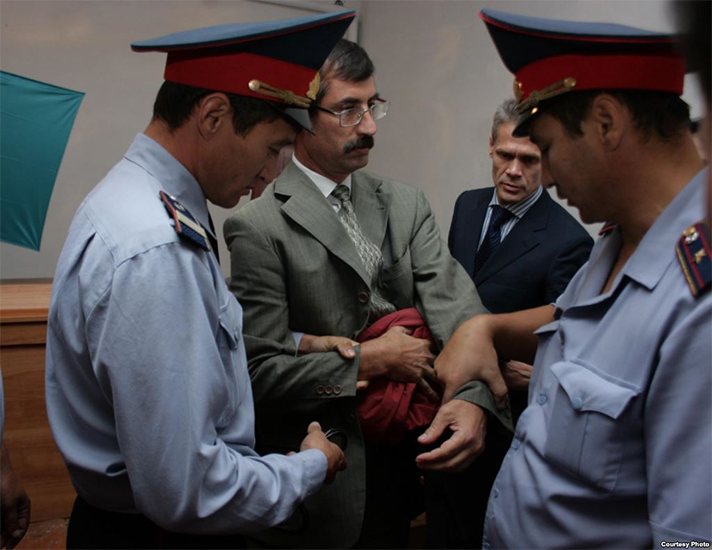
In February 2012, I was released on parole; in May 2012, the settlement was shut down, which is ridiculous. All those poor prisoners were sent back to Astana.
In other words, our country got a settlement of Zhovtis, where I was kept with a group of other prisoners, taken in and out after my 2.5-year conviction.
- They achieved their goal. Few diplomats or European authorities reached Ust-Kamenogorsk with its terrible weather conditions.
- They did want me to stay as far away from diplomats as possible, in order to eliminate any interest in my person or activities.
Indeed, the weather conditions are unpleasant. During my first winter, I shoveled snow at -47 Co. Pretty cold, if you ask.
At first, there were attempts to find me an employment because I was not to be let outside the settlement. A settlement-prison is a conviction where everyone works outside, leaving in the morning and getting back in the evening. For me, there had to be a work inside the settlement – where there is absolutely nothing to do. It took a while until they started a plastic window frame production and tried to hire me there as a security controller. I refused and got a reprimand. At last, I became a malignant disturber.
Further development could be taken from a Kafka book. They started a sewing production and employed me as an inventory guard. I had to accept the employment since there was not much choice. But the funniest thing is, that in the sewing block there was no inventory to guard, and even this production was eventually shut down.
During 2.5 years, until my release, I was registered as an inventory guard in a production block that did not exist. I got my wages regularly. They did so to keep me within the fence of the settlement. Every morning I came to the supervisor and said that I went to work, and then I went to a small carriage where I spent the day serving as an inventory guard. Since I am a very responsible person, I took a ruler and draw straight lines in the inventory book for ingoing and outgoing tangible assets. The only thing that changed in this book was the year: 2009, 2010, 2011…
- Belarusian human rights advocate Ales Bialiatski visited you in the settlement. Around two months later he went to prison. Do you recall this meeting?
- Of course. It was absolutely wonderful and unexpected, a tasteful journalist twist. They told me that he arrived when he already was at the checkpoint.
In a settlement-prison, people are outside all day long, and all meetings take place at the checkpoint. There people used to sit and talk, or walk outside the gates and then get back. Since I was “exclusive”, I wasn’t allowed to leave the gates and I had to take my meetings in the aula that normally stood closed but was opened solemnly for me.
We used to sit in the front row. On the scene, a woman sat at a table and wrote down everything we said. This strict ritual was truly sacred.
When Ales arrived, the director of our “branch-office” in Ust-Kamenogorsk met him. Ales asked what he could buy in our prison store, and the chairperson of the public control commission said that he could buy anything. Ales came with full bags to the aula where a girl from the legal department who was responsible for my visits was already at the table. We greeted and hugged. He was tense in the beginning but then he relaxed when he saw my cheerful mood and good form, although I had lost some weight (prison doesn’t make people better). We talked for three hours; I told him anecdotes and observations from my prison life.
I wish I knew what Ales would soon have to go through! I would speak about different things that could help him much more than my anecdotes about stupid prison rules. When I found out that Ales was arrested a couple of months later, and then condemned, I did not feel good.
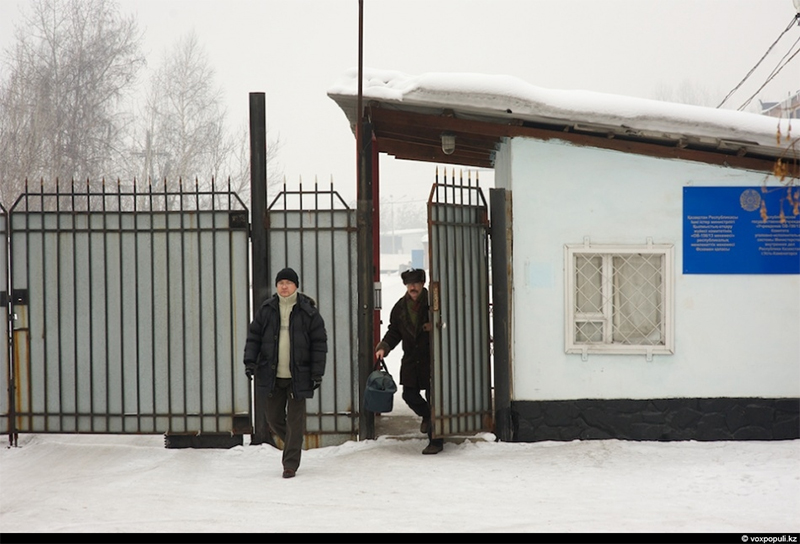
- If you could visit Ales right now, what would you tell him?
- Rather simple things. Everything comes to an end eventually, and one doesn’t have to wait and count how much is left, it only takes away strength.
Isolation jail is not the worst. There you still have strength to fight and write appeals and claims. You still have hope. But when you get to prison, at once you feel that the time becomes more physical, it flows slowly or simply stands still. This is a heavy sensation. It is hard to be a captive. Reading books or contemplating does not really help.
At the same time, it has nothing to do with the anxiety caused by conviction. The thing is that you get caught in the captivity system that has its completely stupid and militant rules and daily routines that nobody needs. Your life becomes monotonous. I tried to learn not to hope, although it was so hard.
The situation with amnesty was a most devastating for me, although I am a strong person. I am a lawyer and I knew much about the previous six amnesties held in Kazakhstan. Normally, authorities announce an amnesty a couple of months before a certain date, and then the parliament adopts a corresponding law. The president quickly signs it and two months later people are released.
On March 15, 2011, the president announced an amnesty, but the decree reached the parliament only in April, close to the summer vacation, and it was not adopted. The parliament get back from the vacation in September. In November, the first chamber adopted the decree, then the second chamber. However, for some reason the president did not sign it. In other words, until January 15, 2012, nearly one year later, people lived on hope. They gathered rumors, tried to find contacts in the parliament…
- It is the same in Belarus. When authorities announce an amnesty, journalists create their own theories and bet on which political prisoner will be released first. But nobody is released anymore. I can only imagine how the political prisoners feel when they read these articles.
- This is a sheer psychological torture by the regime. I would tell Ales not to take it too seriously, to understand that everything comes to an end. He should accept the idea of serving his entire term. If he is released for a political or legal reason, he should take it as a gift.
It is crucial to keep oneself together, physically and psychologically. This is a difficult task to accomplish in prison, but one of the oldest prisoners taught me to forget everything, like in the army. It will end someday, maybe not in two, but in four years.
I believe that Ales is a calmer person than I am. The old prisoner’s advice helped me a lot. I wasn’t so stressed anymore, I became patient and better at discussions. You have to make best of this situation for your personal growth.
- As far as I understood, despite all this, prisons in Kazakhstan are not as frightening as in Belarus. You are familiar with our situation, can you compare?
- In the late 90s-early 00s, we managed to achieve a certain break-through. A reform of the prison system became possible with international support. Obviously, the powers would never agree to compromise in the political sphere. But unlike Lukashenka, Nazarbayev is an integrated part of the global economic system. He really wants to look modern, enlightened and progressive. Even if the world sees him as an authoritarian ruler, he wants to show dynamics and knowledge of his material (I mean the nation). That is why changes became possible in some spheres, like for example the penitentiary system.
By 2004, we managed to shift control over the system from the Home Ministry to the Ministry of Justice. We created a system of public control commissions authorized to visit prisons for monitoring and prevention of tortures that had been common in prison. The scale of tortures really reduced. I cannot say that the prisons became more humane, but the tendency to follow the law became much stronger.
In 2011, this process came to an end and the Home Ministry regained control over prisons. It became worse, but not as bad as it is in Belarus, Uzbekistan or Tajikistan. Moreover, starting this year a national preventive mechanism came into force. It allows monitoring visits to prisons, even without warning.
Frankly speaking, in my case they tried to act more or less decently because I was one of the most famous political prisoners.
- In Belarus, the more famous the prisoner is the more violent treatment he or she gets.
- In Kazakhstan, it is the other way around. They do try to follow the rules. Even though they did not let me outside and treated me in an “exclusive” way with lots of breaches, they did keep to certain standards.
- I know that you met with Belarusian presidential candidate and former political prisoner Andrei Sannikov during a session of the PA OSCE. What part of his experience from prison was most interesting for you?
- Before meeting Sannikov, I had learnt a lot about him from the film Europe’s Last Dictator. Of course, I was surprised that Lukashenka relies so much on special services and force institutions. They have so much authority that assaults became a normal thing.
It is hard in Belarus. The powers rule in a very harsh manner. In Kazakhstan, they try to stay within the norms, apart from the shooting in Zhanaozen. They don’t press and beat with no reason.
At the same time, we have never had such a strong opposition between the powers and their peers. You could organize rather big demonstration, while we could never gather more than 3000 people – they just won’t come, for various reasons. This is one of the explanations for this difference.
Of course, I was shocked that violence is such a common tool for your powers. Unlike Belarus, in Kazakhstan, nobody ever kidnapped opposition leaders. However, two peers of the powers have been murdered, which is appalling. Nevertheless, the executioners went to prison, even though those who had paid them are still free.
Abductions and murders that happen in Belarus show that your regime is definitely harsher, which is rather interesting because Kazakhstan is an Asian country while Belarus lies in Europe.
- Former political prisoner from Cuba Guillermo Fariñas spent 12 years in prison. When he spoke at the Andrei Sakharov award ceremony in the European Parliament, he said “What can you do for Cuba if you cannot solve the problem with Belarus – a country situated in the center of Europe?”
- He is right; I will not even add anything about Kazakhstan. Just let me give you another paradox example – Turkmenistan. This is a typical North Korea, maybe somewhat better. And this country is an OSCE member, it participates in discussions that are “human”, so to say. However, Turkmenistan breaks all sorts of obligations.
I am a member of the campaign Show Us That They Live. After the death of Turkmenbashi, about 60 people in Turkmenistan went to prison, some for a lifetime, and some for 30 years. Since 2002, nobody – neither the Red Cross, nor families or lawyers - has ever seen these people. The people vanished. I’ve heard rumors that 15 are already dead… Among these 60 people there are two former foreign ministers, former delegator from Turkmenistan to the OSCE, many different businessmen.
During these 12 years, the West has failed all attempts to help the families find out what has happened. The families go to court. Widow and son of Boris Shikhmuradov are fighting in Europe… But there is nothing they can do, do you understand?
Even though Turkmenistan is not in Europe, it is an OSCE member, but still nothing happens because any demands are as meaningless as it is meaningless to ask North Korea why it doesn’t follow its obligations under the International Civil Rights Treaty. Unfortunately, Turkmenistan had death penalty. Even though it was abolished, their technologies are medieval. The public attorney who passed the verdict on attempted murder got 25 years in prison. This is a normal practice for Turkmenistan, where nobody cares about anything.
- What can stop it? Can the situation in Ukraine awaken the West?
- The West has obviously forgot about us. Russia is their main problem. You know, it is like a disease that spreads everywhere, contaminating everyone with its lawless and atrocious politics of authoritarianism and hatred.
While we have this disease, we cannot expect that an external party will take our problems seriously. There are not enough resources. What can be done with Turkmenistan? Turkmenbashi 2.0 Berdymukhamedov raised hopes at first, but he continued in the old fashion because he wants to survive. Local systems will reproduce the same type of leaders unless something happens inside the country. What can it be? An economic collapse? Until they have gas and oil, until the West needs these resources, there will be no collapse.
I don’t know how well you know the history of the Tajiki war. During its first stage, in the early 90s, it was democrats, not communists, who gained the power. Kadriddin Aslonov, the chairperson of the Supreme Council, was an intelligent person, but the West missed this chance and didn’t give him financial help, like in the situation with Ukraine.
Now the West decided to give Ukraine the money to prevent its economy from collapsing. Tajikistan was a poorest country with no institutions that could sustain it in that turbulent period.
Do you know what happened to Aslonov? He was brutally murdered. They chopped off his head, hang his beheaded body on a gate, and murdered every person in his native village. A medieval revenge that cost several hundreds of lives. It is no surprise that former field commander Rakhmon came to power.
All those opportunities that the country had in the early 90s when the situation could be changed were lost due to various reasons.
- The West simply had no strategy on how to deal with the post-soviet countries.
- Exactly. Let me put it simple: there was no proper Marshall plan. Now it will be very difficult to solve this problem. Until now, we have been following the stream.
- You are too pessimistic. I believe that we may be living in a critical time. Yes, Russia is the aggressor, but its economy is weak. There is no sensation of a superpower, but there is a sensation of collapse.
- I do agree. For me, it is obvious that the systems built on the ruins of the USSR have reproduced the main soviet traits and elements. They have the same drawbacks and vices as the soviet system. Hence, I am convinced that their end will be similar to the USSR collapse. It is a question of time.
These systems cannot perform their key functions. They cannot provide social justice or fight growing threats. They can only mobilize and fight back with force, pushing the problems deep inside instead of solving them. It makes these systems very feeble.
In other words, you are right. The main question is what the outcome of it will be. The risk is that what may seem to be the end can turn out to be a continuation. A key problem is how we can overcome the soviet past. We have to be honest. We chose a wrong path and did much wrong. Now we have to admit it and start looking for a way out from this deadlock.
